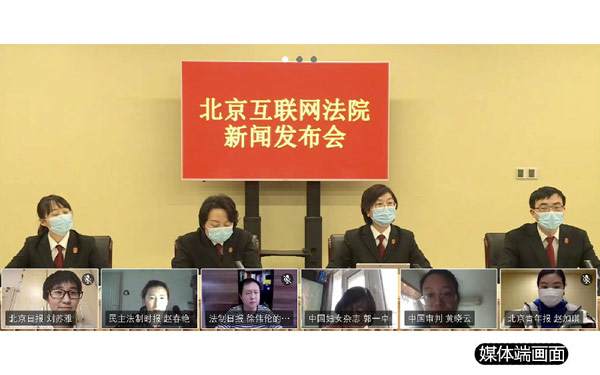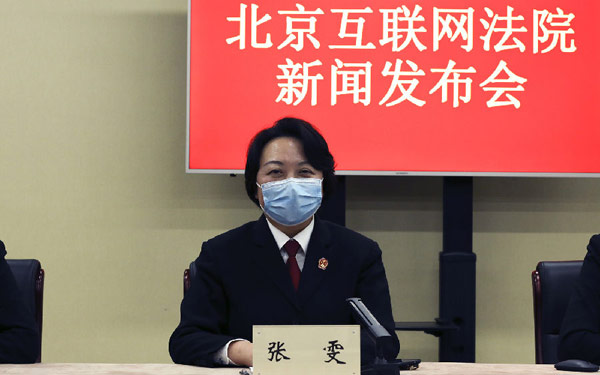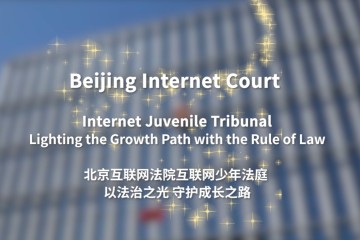Beijing Internet Court releases e-litigation norms

The Beijing Internet Court holds an online press conference on the norms of e-litigation. [Photo/Beijing Internet Court]
The Beijing Internet Court held a press conference to issue its norms for e-litigation on Feb 21.
The live-streamed conference was held online using a cloud platform video-conferencing system.
Thirty-six deputies of the National People's Congress carried out "cloud supervision" by watching, reviewing the live streaming video, online comments and WeChat interactive feedback. The live streaming attracted over 810,000 views.
At the conference, Zhang Wen, president of the Beijing Internet Court, issued the court's norms of e-litigation.

Zhang Wen, president of the Beijing Internet Court, issues the court's norms of e-litigation at the conference. [Photo/Beijing Internet Court]
Zhang outlined the court's basic approach to online litigation as well as the norms' background and main content.
As a pilot and model of reform the Beijing Internet Court has successfully built an online litigation platform, initially formed an online litigation mechanism and gradually promoted an online litigation culture after more than a year's work, Zhang said, adding that through 13,509 online trials with a total duration of 7,792 hours, the court has accumulated rich practical experience in platform building, environment setting, trial procedures and technical details.
Zhang pointed out that the norms vividly embody the practical experience, research results and work requirements of online court trials. They also guarantee strengthening of online litigation and bolster the fight against the epidemic.
The norms' main content and characteristics such as trial principles, identity certification, dress code, discipline requirements, asynchronous trial methods, audio and video recordings, court attendance, appearances, and withdrawals were introduced at the conference. She emphasized that the norms are partly reproducible for online court trials, but are also adjustable by the court for the cases it has accepted.
The norms of the Beijing Internet Court e-litigation have many highlights, according to Xiao Jianguo, a professor at Renmin University of China.
In the context of online live streaming of e-litigation, the court has used scientific technology plus physical method for the first time to ensure that witnesses cannot listen to the case through the trial live streaming in advance of their testimony.
In addition, the previous relevant provisions stipulated that when the trial's transcript is inconsistent with its audio and video recording, the latter shall prevail. Therefore, the norms are an assurance that trial efficiency is greatly improved by replacing transcripts with a video record in actions with small amounts at stake or trials with simple procedures.
Liu Zhewei, an associate professor of Peking University, pointed out that the norms issued are not only a powerful measure to provide judicial relief during the epidemic, but also a guideline for future e-litigation.
He highly affirmed two features in particular: firstly, the court develops its technical advantages and integrates them into its online court trial platform, and provides technical support for the litigation parties to participate in the online court proceedings. Secondly, it strictly abides by the legal bottom line to ensure the classic form of a court trial and maintains judicial authority while improving convenience.
At the end of the press conference, reporters asked questions about how to ensure the etiquette of online trials, how to ensure the objective and true testimony of the witnesses, the relationship between the Internet court and the traditional court and their future development, and the preventive measures of the Internet court during the epidemic, among other issues. The judges of the Beijing Internet Court answered the questions in detail.

 Judicial White Paper
Judicial White Paper
 Play
Play Play
Play Online Lawsuit Guide
Online Lawsuit Guide Beijing Internet Court Lawsuit Service WeChat Account
Beijing Internet Court Lawsuit Service WeChat Account  Beijing Internet Court WeChat Account
Beijing Internet Court WeChat Account